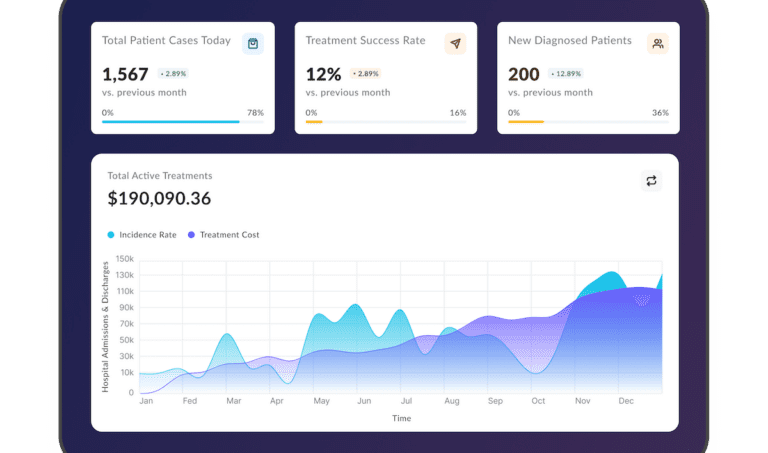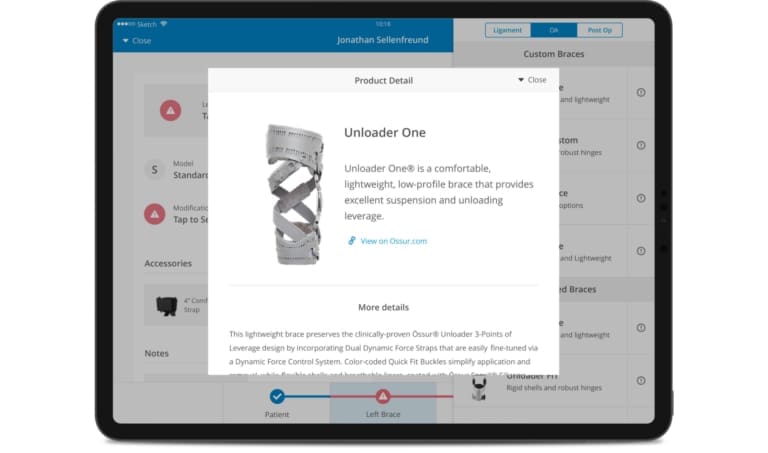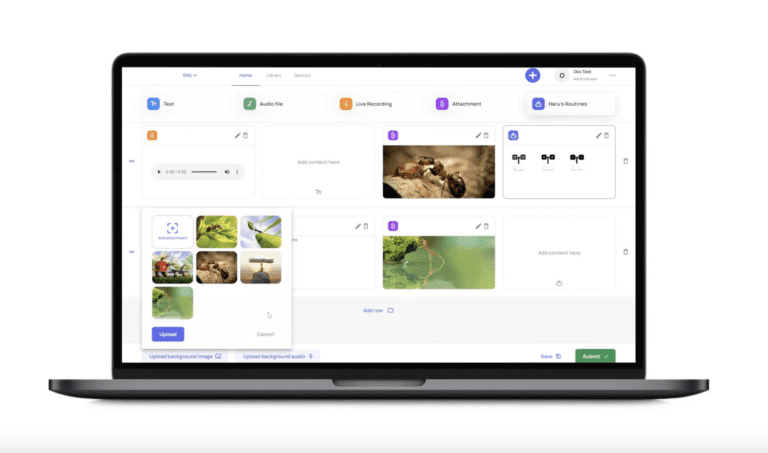How to Build a Fintech Product with 150 000 Customers—Damian Brychcy, COO of Capital On Tap
Damian Brychcy, COO of Capital On Tap, sat down with us to share his startup adventure, the backstory of Capital On Tap, its MVP, and why a startup offers so many opportunities—the ability to grow and thrive if you are willing to work for it.
Capital on Tap was formed with the express intention of making the lives of small business owners easier. They have developed technology that provides businesses with greater control and benefits—solutions that enable small business owners to operate their businesses faster, easier, and more rewarding. They have made it easier to run a business by simplifying how they access and manage finances.

We provide companies with senior tech talent and product development expertise to build world-class software. Let's talk about how we can help you.
Contact usThe idea of helping small businesses in the United Kingdom access working capital was the driving force behind Capital on Tap. When it came to servicing small companies such as florists, pizza parlors, and mechanics, banks left a void in the market. Since there is so much money to be gained in the corporate sector, banks are concentrating their efforts on that enterprise. However, Capital on Tap saw an opportunity in the consumer sector that banks were neglecting.
In this article, you will discover how to create, in Damian’s experience, a product that feels like magic to the customer, the importance of quantifying risk, and the need for entrepreneurs to thrive and crave ambiguity.
Table of Contents
How Capital on Tap seduced Damian with an 80% pay reduction
After finishing his engineering degree, Damian opted to pursue law. Damian quickly realised that becoming a lawyer was not all it’s made out to be. He claims that being a lawyer is one of the worst career decisions you can make. After a two-year stint in which he gave it his all, Damian decided that enough was enough. Everything changed for Damian when a member of the Capital on Tap team gave what Damian called the worst pitch you can imagine: How would you feel about accepting an 80% pay drop, having no titles, and joining my startup?
In 2017, Capital on Tap shifted its focus from lending and loans to what Damian views to be the greatest credit card solution for small companies. A working capital facility is also available in the event a customer requires more funds – providing a better and more accessible way for smaller enterprises to manage their business.
“If you’re a florist with two assistants, you can give them Capital On Tap Business Credit Cards and tell them, hey, you can spend 1,000 pounds a month or 100 pounds a day. You can connect all of our transactions into your accounting software and you can receive best-in-class rewards,” Damian said.“. We really found our market fit when we made that pivot back in 2017, to the credit card product.”
The building of the product: What did your initial MVP look like?
Damian told us how a “hardcore” approach to constructing your MVP has both perks and limitations, but the most essential advantage is being able to quickly assess whether or not you’re providing value to your customer.
Capital On Tap’s MVP was a website that tested whether or not they could approve clients for their initial lending product. The product launched with only two options on the client portal, which allowed you to request funds and then pay them. Damian and his team decided to opt for simplicity, not needing to complicate the process. He tells us that there was nothing else, no information, nothing but a grey screen with a green and an orange button.
“Everything was done manually. If you were authorised for 10,000 pounds, our clients could only use the dropdown key to select the ‘receive money’ option. So it’s actually just a facade of software. On the back of it, we’ve built a lot more software and technology.
I truly believe in the demo approach, because if your consumer simply wants money, all they really want is a button to get funds, 10,000 pounds, and push enter. And then everything else was up to us to manually facilitate, making sure we did it quickly. It seems like magic to the consumer since we made it so simple and easy for them to get a hold of.”
While today’s product is backed by a proprietary technology powerhouse, it doesn’t sacrifice the simplicity or ease of use of what was available upon launch.
The backend of Capital on Tap: what functions are used for card issuing?
“Picking the right partners is one of the most critical decisions a business can make. And so, if we think about our card processing platform, we’re built on top of Marquetta for integration into Visa. We built what we think of as the core banking platform in-house and then we’ve got vendors into it also.
We use Marquetta as our card issuing platform. On the acquiring side, we use Stripe Checkout and GoCardless. On the KYC side, we use everything from Experian, Equifax, TransUnion, and LexisNexis.
Building that fully automated customer onboarding journey with all those API calls is the core of what we do”.
Outsourcing: The approach, hesitations and advice
When demands started to grow, Damian and his team decided to outsource the backend CRM system, under the name of ‘Mothership’— the CRM that had been overbuilt. Hiring a mix of American, Indian, and British contractors to create the infrastructure that was already built, one of the things they learned was that it didn’t account for the ten pivots the company made later on in its journey while trying to establish product-market fit.
Outsourcing criteria for Capital On Tap
Damianstressed the importance of searching for software vendors through references.
“We had an angel investor who recommended a certain team that he was already working with. We went into it pretty blind at first. David was only 26 years old at the time. He had previous experience in private equity and management consulting, but not in putting together a checklist for hiring a contractor, as the team was still quite young at that time”.
After all the experience you’ve gained, have the criteria changed compared to those early days?
Over the previous ten years, Damian told us how they have tried a few outsourcing initiatives, with two key takeaways.
“The first is that we are not a team that will just hand over a checklist or a requirement and say, ‘Come back in three months and show us what you’ve done.’ We found that whenever we try to complete a large project, we do this with our CRM system. And with our initial version of our mobile app, we just supplied the specs of what we required and then said, ‘off you go.’ Almost every one of those ventures failed. They launched, but they are always terrible, not built for the job, and never lasted very long. We came to the realisation that you must integrate. The more you integrate outsourced teams into your team and see them as extensions of your team rather than a black box that generates results at the end, the more likely you are to succeed. That’s the criteria for success.”
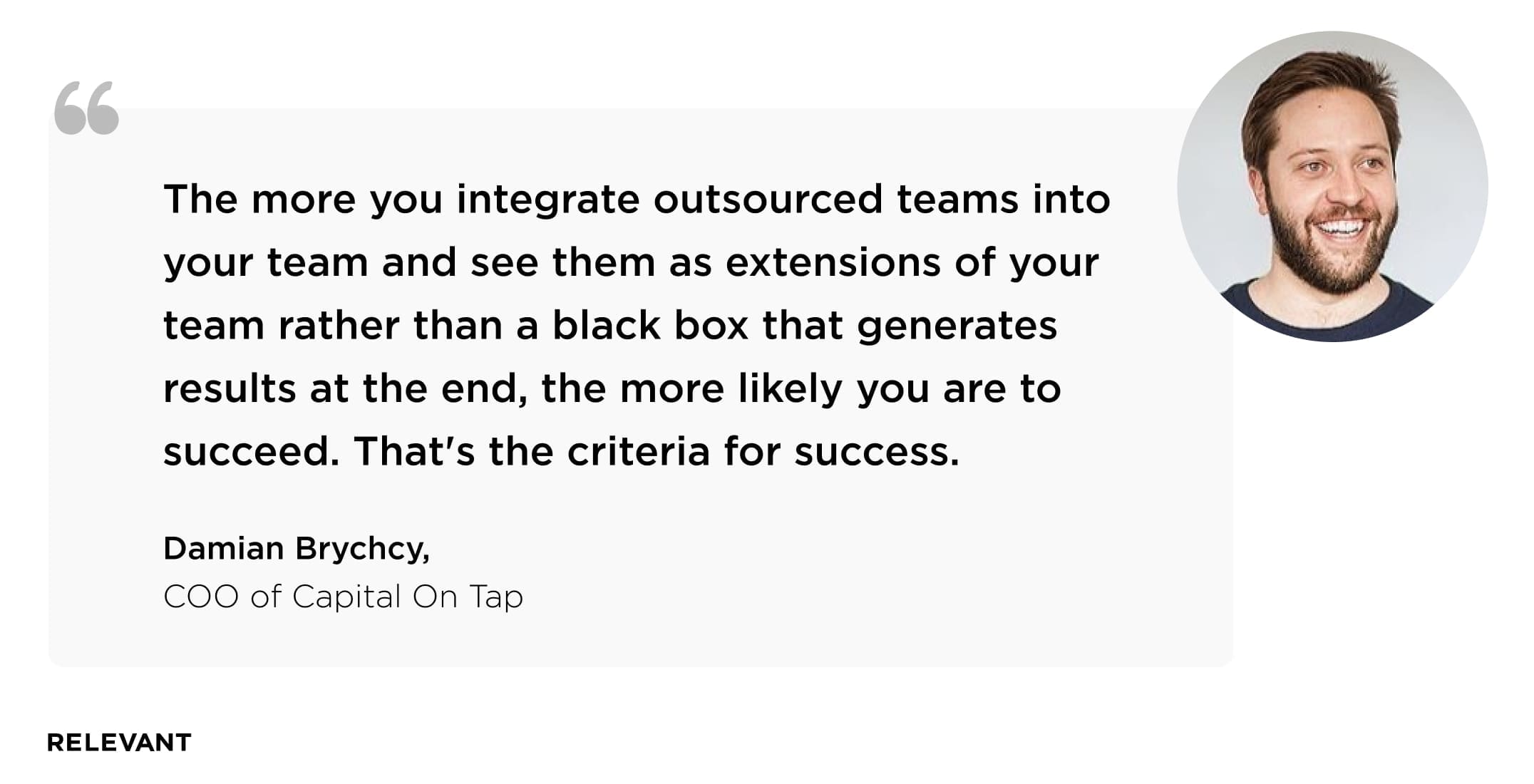
Now, when they outsource vendors, they first determine whether or not these individuals are culturally compatible with the way they operate at Capital On Tap. Damian suggests asking yourself, upon choosing a vendor, whether they seem like an extension of your team.
“We’re maniacal about referencing these agencies, and if it’s an engineering outsource, we’ll actually send a couple of our developers into that party for two days of working with them before we sign up. So, in essence, go deep and treat them as if you were hiring internally”.
Fears and hesitations about outsourcing
“You have to know exactly what you want to build, otherwise it will result in a pivot and adaptation strategy. The more of a pivot and adaptation strategy it is, the less I would be likely to outsource it.
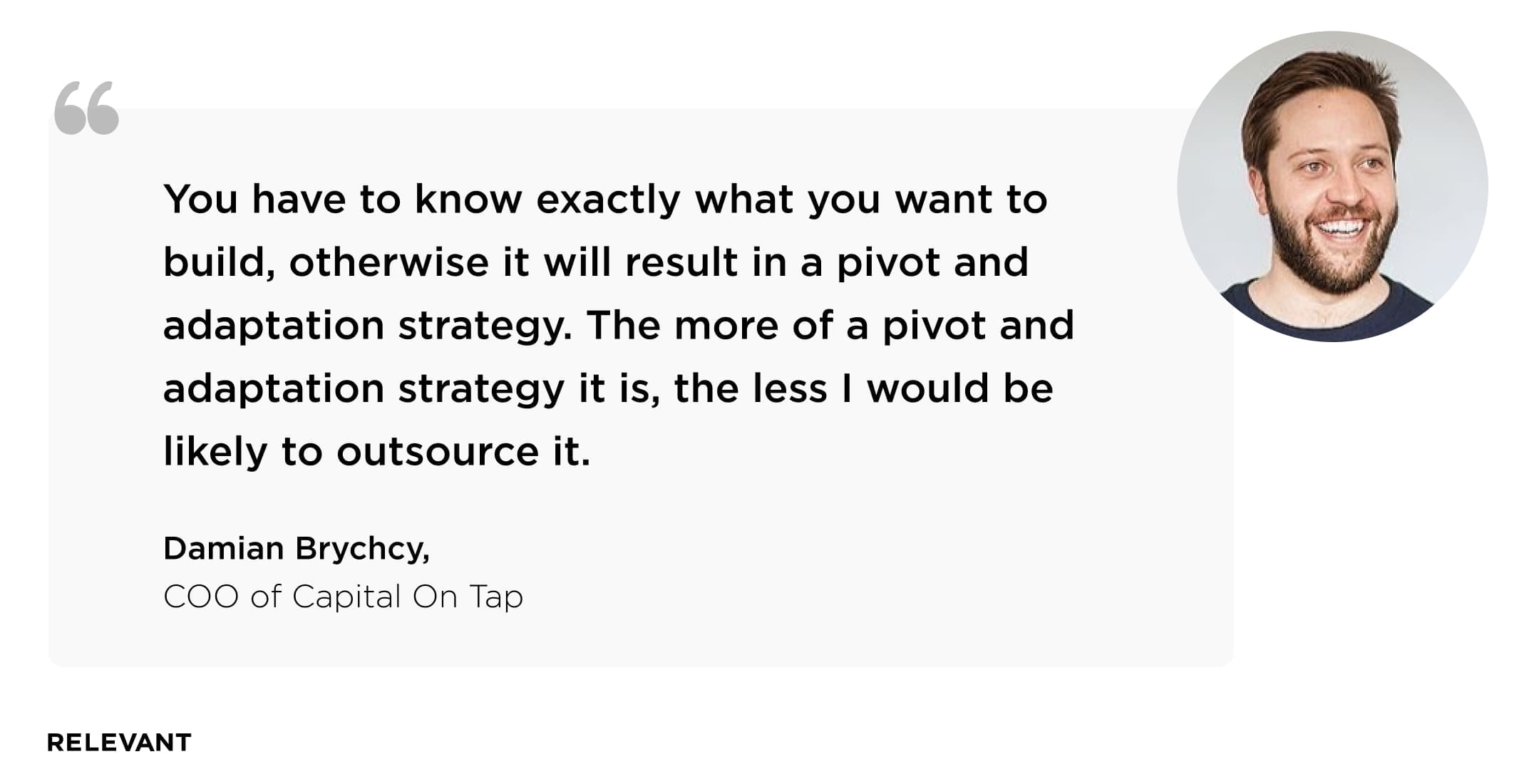
For our card processing, we needed to create a decision gateway engine. We had all of the parameters, regulations, and requirements down at 95 percent planned. Then I believed it would be a smart idea to hire a third party, integrate them into the team, and help us construct it quicker. You’re trying to launch a new product to cross-sell into your customer base. It involves a lot of discovery, a lot like market testing – which entails a lot of exploration, similar to market testing. This needs to be a SEAL Team Six style—get the five best developers and good product people, a designer, and a growth person to solve this problem.”
Hiring: Who is the perfect fit to work at Capital on Tap?
“If you have ambitious goals as a business, and you have a team internally already that’s extremely smart and hardworking, the best way to find great people is to sell them truth. We’re going to work really hard on really hard problems with really smart people.”
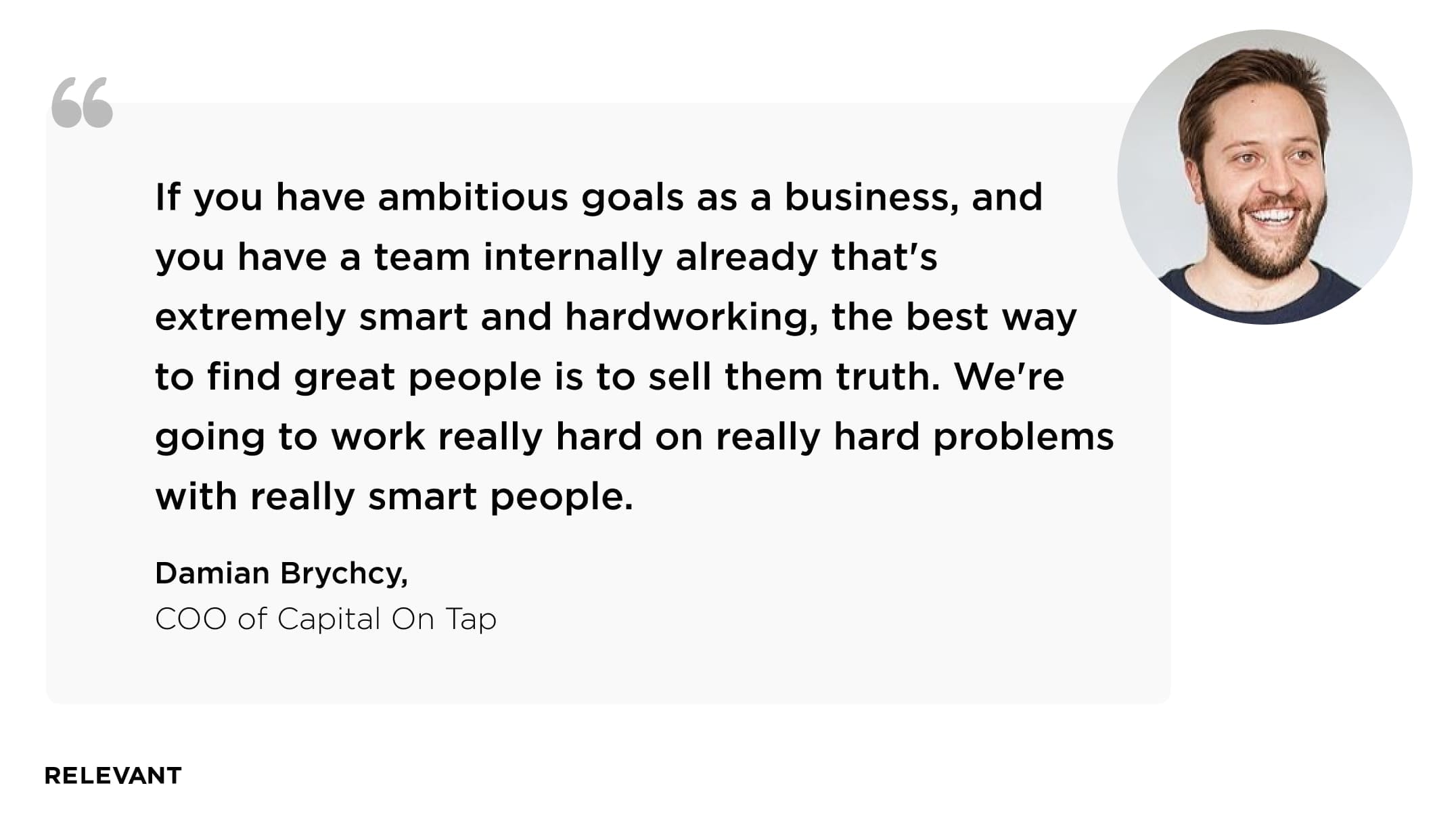
And the right people will be attracted to that. It’s not like, ‘Hey, this is gonna be a fun job.’ It’s a great place to work if your idea of fun is solving difficult problems with smart people, which is my definition of fun. As long as you’re honest with people, like, ‘Hey, this is going to be really hard. And these people are going to be the smartest people you’ve ever worked with. You should come to join us.’ You can sell that dream, which isn’t a dream to many people. It sounds paradoxical. But to me, there are a lot of people who don’t want to do that.”
The right fit for a startup: how to hire the right people
“People who enjoy discipline and dislike uncertainty won’t perform well in a startup, and those who believe they want ownership and a lot of leeways won’t either because when they get it, they become lost. That’s the toughest aspect about it, especially in a more senior role. Imagine arriving at work with zero items on your to-do list, and you have to generate your own to-do list. Most people get so much anxiety from this, and cannot function because they don’t know what to do – because no one is telling them what to do. If you want to succeed in a startup, you have to not just like ambiguity—you have to thrive and crave it.”
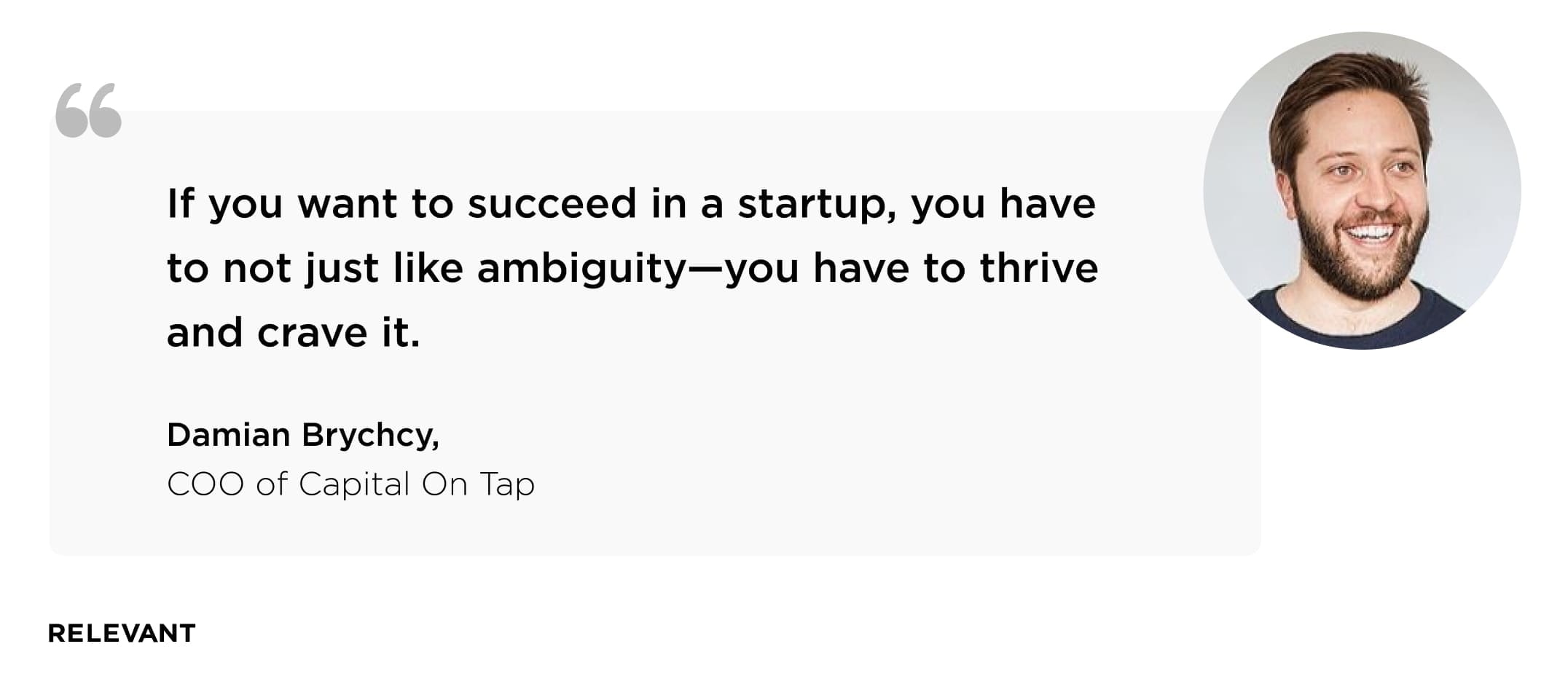
Current market: Challenges and opportunities
Everyone who has attempted to employ engineers in the last two years knows it’s an exceedingly difficult market, but Damian believes seeking out the perfect engineer is a lot simpler in Europe than in the United States. One of the reasons being salary and the ability to offer a salary higher than what the candidate potentially is worth—although in Europe, Damian believes the rates are still ‘relatively reasonable’.
“The large tech companies are waging the war with salaries and stock options, throwing around ridiculous figures. Junior developers in the United States can earn up to a couple hundred thousand dollars per year.”
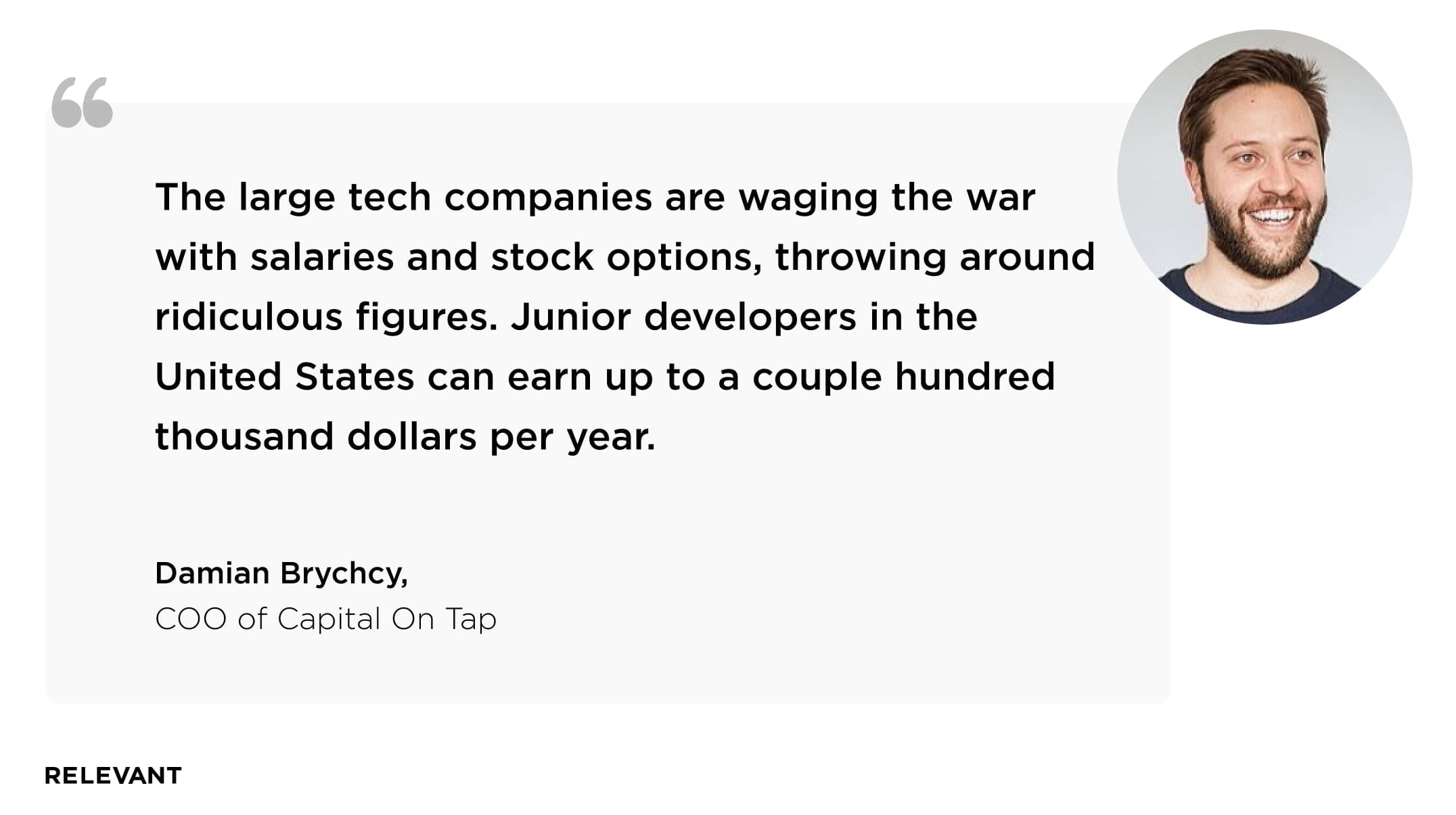
The Tech industry has always been somewhat remote, but after COVID it seems remote work for many is now a requirement and not just a luxury, and so employees have to be prepared to offer a flexible working approach. Damian told us how they offer remote and hybrid work, but try to keep the door open for in-office work or events at the office to create that atmosphere of being part of the team and getting the much needed social interaction. As long as you’re offering a great place to work with a competitive salary then Damian believes there are ways in which startups can compete against Google.
“Remind them that, at Google, they would be 1 of 10,000 engineers. Whereas at a smaller company, a startup like ours, you could be one of 50 and really make an impact. You will have that job satisfaction and be given the floor to solve really hard problems”.
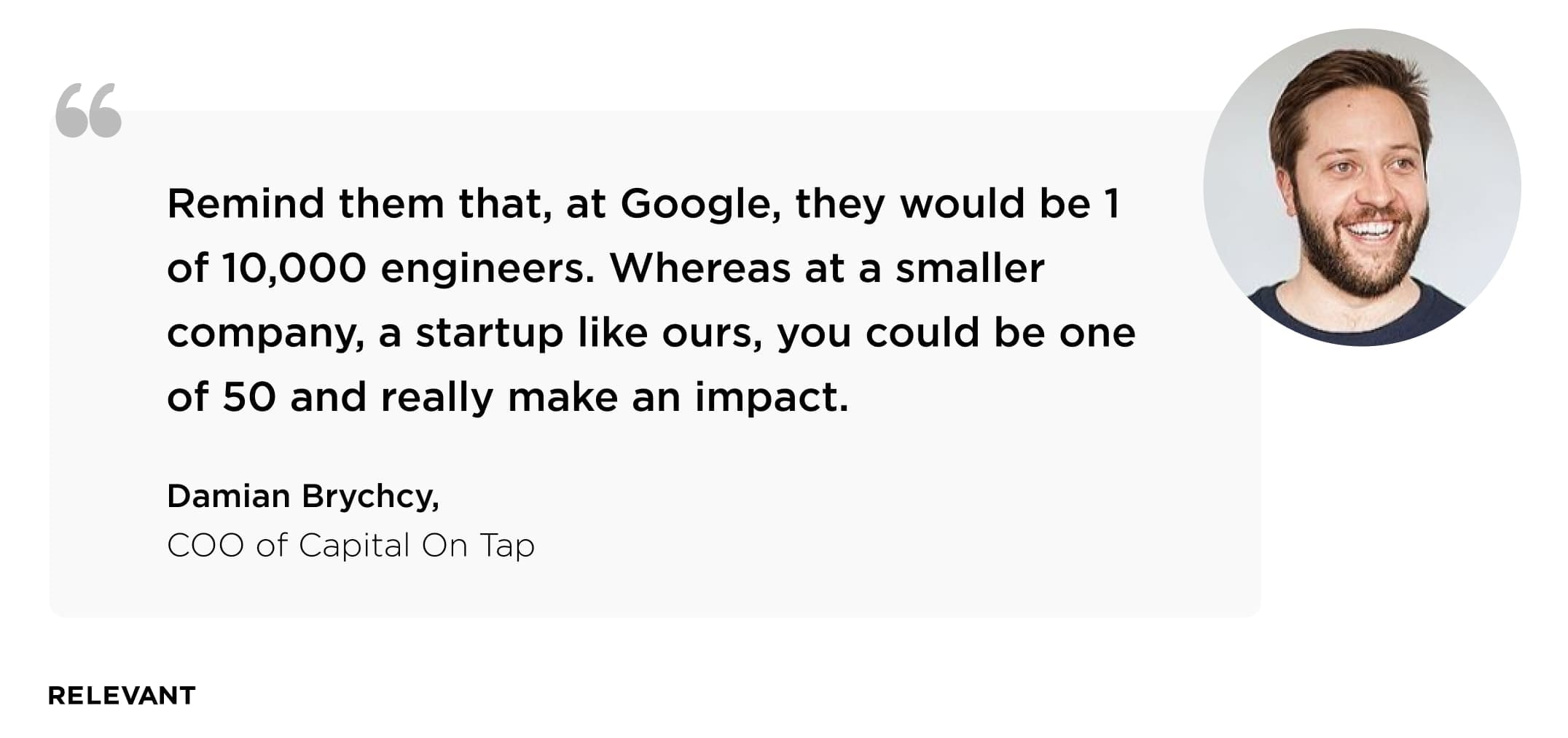
What is the secret to retaining your employees in a world of Googles and Microsofts throwing around 6 figure sums?
According to Damian, “It really comes down to how and who you’re recruiting. In the event that your workers are bored and feel undervalued, they will look for a better opportunity elsewhere. A startup needs individuals who like collaborating with other smart individuals on solving complex issues.
If you recruit the appropriate individuals and deliver on your promises, I believe many will remain because they see the growth. Successful startups have a secret advantage of growth. Growth addresses all retention issues because as teams increase, products develop, and geographies expand. There will be more interesting projects to work on. I believe it’s where startups have a secret advantage.”
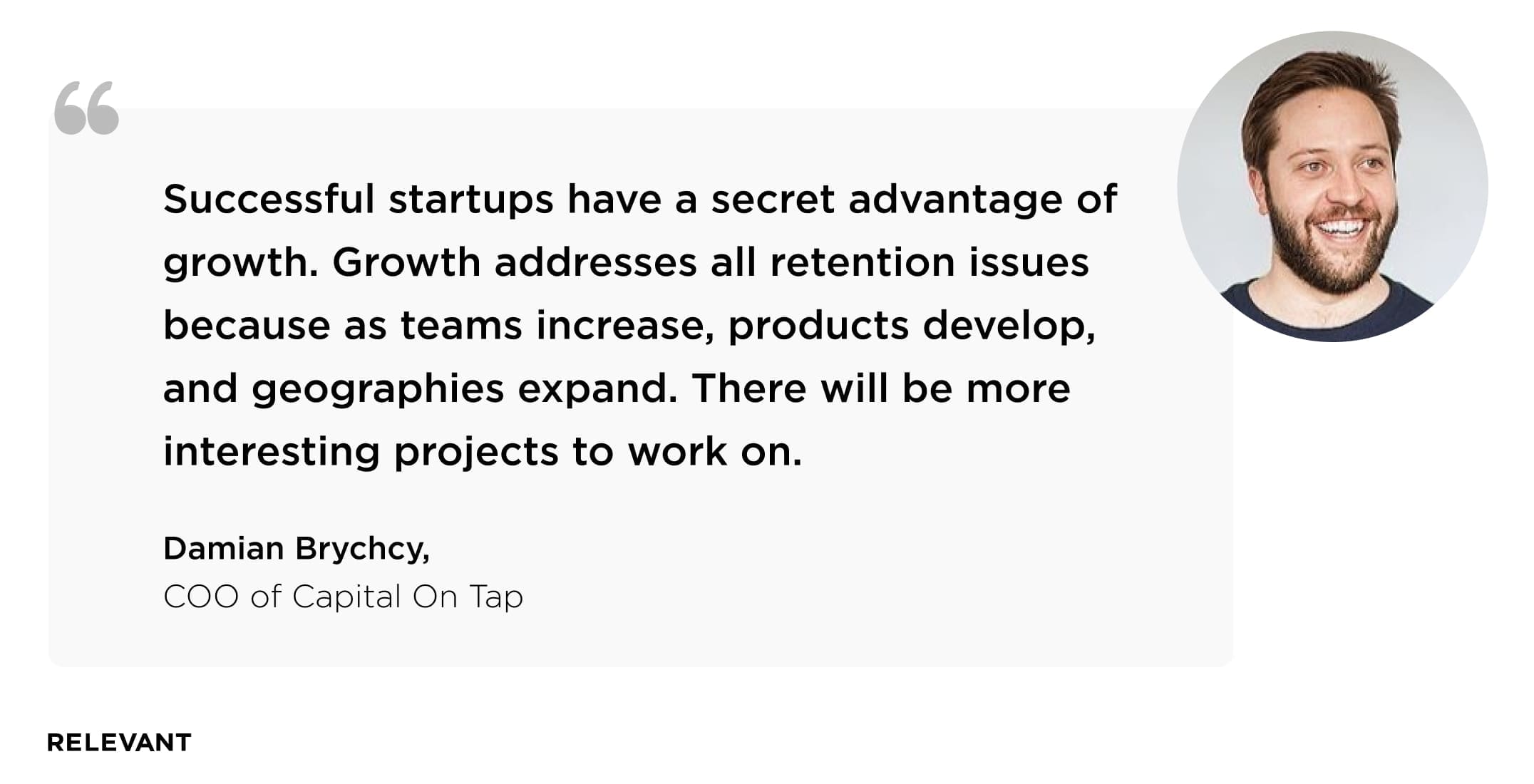
Zoe Newman, an early employee of Capital On Tap, joined the team as the second customer support representative—her first job out of college. She grew with the company and now runs the whole US business. Damian highlights that when you give individuals room to grow, you can allow extremely intellectual people to shine.
Profitability: How Damian and his team scaled Capital On Tap from a $1.3 million revenue run rate to about $220.
According to Damian, there is a ‘secret sauce’ Capital On Tap employs in order to achieve huge growth and scale the business, and it has shown to be highly effective. When Damian joined, Capital On Tap was holding a $1.3 million profitability. Fast forward 8 years and he explains how they are now generating about $220 million in sales on a year-over-year basis. The secret to success: being resourceful with the funds you have and focusing on achieving a true market fit, finding the team that is capable of completing the tasks of 20, and remaining hyper-focused on what the customer needs.
“We never had external rounds of funding from professionals from venture capital. Instead, we have three ‘super angels,’ or high-net-worth people who contribute to the company, raising a pretty small sum of cash combined. We had to be incredibly resourceful. We knew we couldn’t afford billboards on the tube (London Underground), so we had to figure out how to make every dollar count. When you get $100 million from venture capitalists, they want you to spend it on these things while simultaneously launching your second and third products before achieving true product-market fit.
No distractions meant we were hyper-focused on making every dollar of marketing and branding work for us to attract consumers. Attracting customers means revenue. It also drove us to think creatively about how to employ great individuals without hiring too many. We don’t have $100 million to recruit 20, therefore we needed two people who can perform the job of 20. We couldn’t afford to manufacture five products and launch in five markets at the same time. This fueled creativity and attention. We learned how to execute it without a lot of money, and we haven’t raised any outside financing over the last 10 years. The early funding meant profitability was something we had to reach. When you have to reach profitability to run your business, it focuses you a lot more on that goal”.
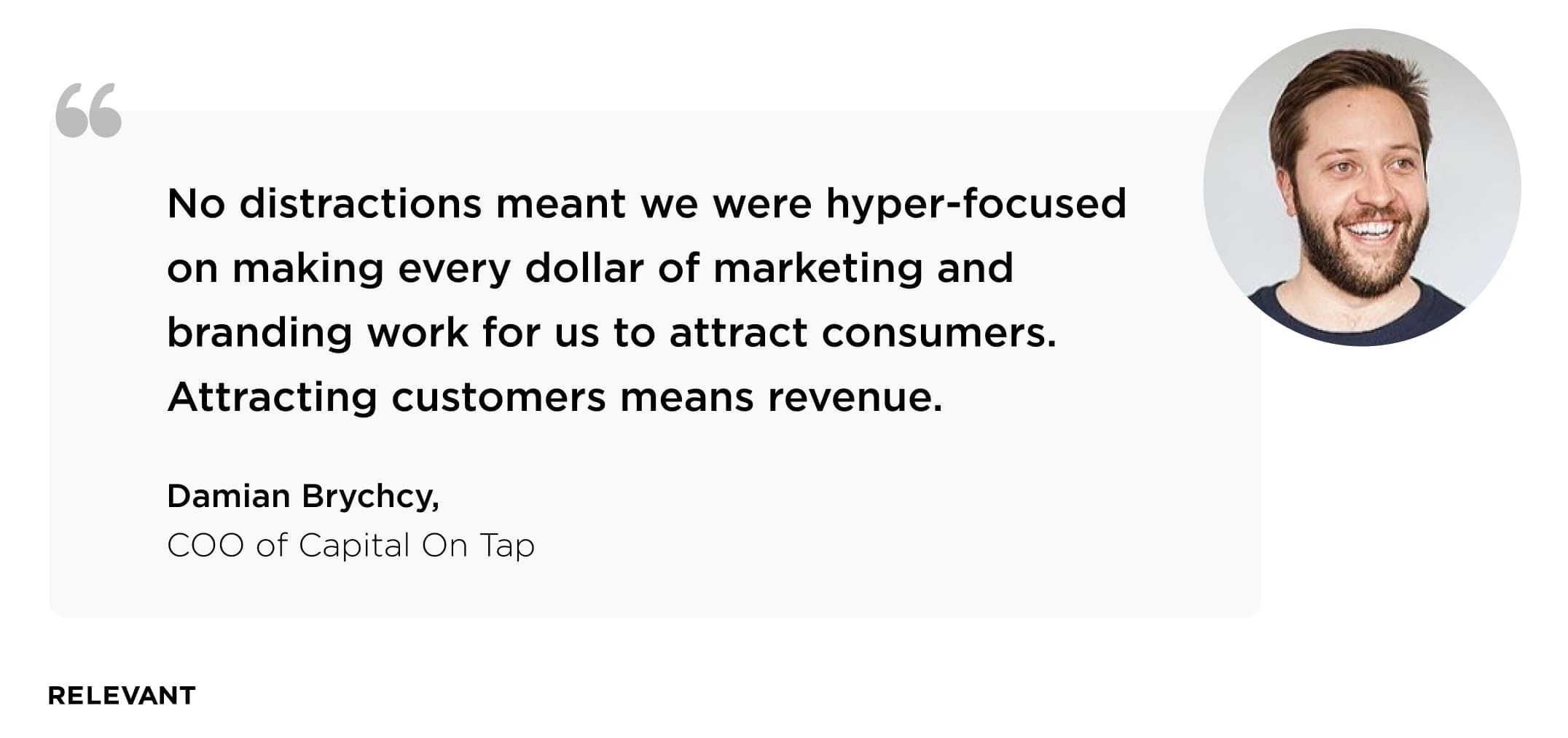
Past Experiences: How Damian’s early career as helped Capital on Tap thrive
“Being able to quantify risk, and thinking about risk probability is what lawyers do. Your client comes to you and says, ‘Can you do X?’ You go away and study some laws and regulations, and then you have to reply, “Yes, but. The license may not be required if you do it this way.” You must identify certain grey zones and the risk of playing in the grey area.
Startups do this every day. You must know the risks. The ability to measure and think through the risk will help you proceed quicker. As a business, it’s one of the core skills that any startup operator needs.
It’s not just risk. It’s also how you think about making bets. Let’s imagine you want to explore a new channel for client acquisition and you have $10,000. Then you need to assess the risks of opening that channel and compare them to the regulatory, legal, and commercial risks. The board and the CEO are asking you, “Should we do this”, and you’ve only got three data points, asking to make a $20 million bet. This falls completely on you and a lot of people struggle with that kind of risk and uncertainty.”
Breaking into the States: Challenges and Benefits
After Capital on Tap’s success in the UK, they decided to go for the next market and break into the United States. Everything was ready to go and they were confident it was going to work out, but not quite as quickly and successfully as it did. Few things work on day one and so they believed they had more time to build and develop the team and processes stateside, but customers caught onto the product immediately with requests coming in non-stop.
“Distribution and getting customers is the hardest thing any startup has to do. Most people don’t want new products—they are OK with the status quo. We’ve, however, identified a product-market fit with the product that we’ve been using in the UK, working from day one. The problem is that we didn’t expect it to work right away in the States. We had almost no staff working between product and operational support for a year – rendering us in a 12-month scramble to support that business. We were signing 1,000 new clients every month, but not planning on scaling so rapidly.
Luckily, we had our UK business. So we set up a support centre in Cardiff. We chose 20 individuals to promote the US and taught them how credit cards operate in the US. e were able to leverage a lot of our UK business to support the US growth.”
Why did it take off so quickly?
“I don’t think we’ve seen a new entrant in what I think of as the core small business market. In the US we’ve seen a few corporate credit card players doing really well. The likes of Brex and Ramp, but they were serving startups. Their core market was startups and medium-sized businesses, not what I think of as the florist or the mechanic—these are really core small businesses.
A comparison website is the best place to start. We’ll name it creditcards.com for now. If you’re a small company looking for the best business credit cards, a comparison website will show you a list of Amex, Capital One, Wells Fargo, Bank of America, and us. It shows that no one is coming to compete with the banks, but ours is one of the first new names on the list. As a result, I believe it was a breath of fresh air for many.”
Future Trends: what trends are set to emerge in fintech
Damian described how financial services have been unbundled over the previous eight to ten years, with many companies focusing on just one high-quality product. As a result, each fintech has carved out its own niche, just as banks do for people, small businesses, and corporations. From a bank account to a modest loan to invoice financing, they provide something for everyone. However, Damian believes the future will be increasingly focused on fintech bundling, with fintechs starting to resemble conventional banks and providing new products.
“I believe we’ll see more M&A in fintech, where a small company invoice factoring service would join. With so many small companies and consumer clients, the next stage is to cross-sell additional items and provide the best-in-class experiences. I actually think the fintech landscape will start to bundle a lot more than we’ve seen”.
You unbundle to go fast and you bundle to make more money. It can be counterproductive to what kind of end-users customers need. But I think if you re-bundle intelligently, you can do it so much better than banks.
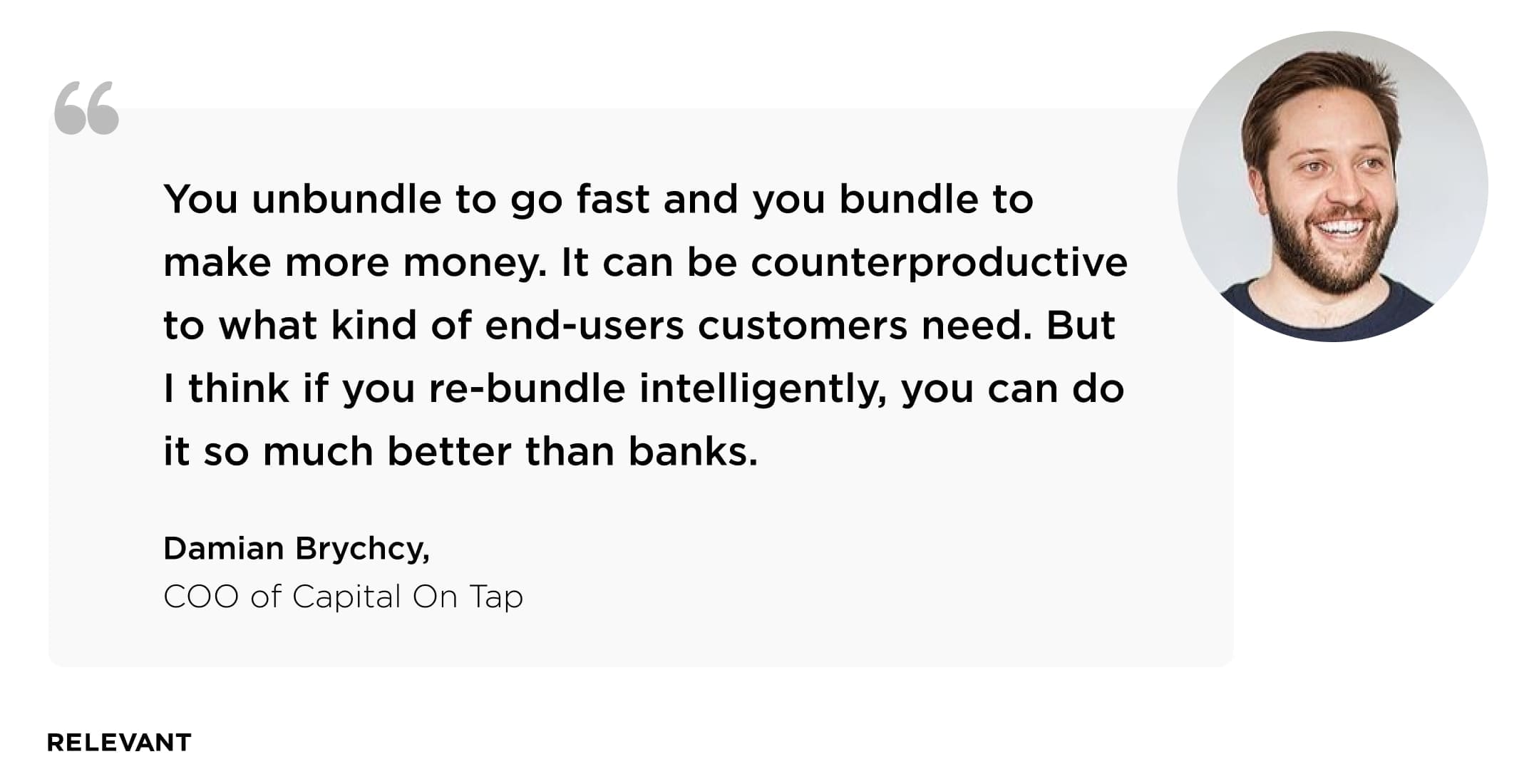
I believe the re-bundling will revolve around the end-user. So if we started bundling our services, we’d focus on small businesses rather than trying to be everything for everyone. I believe we will see bundling centered on the client, as opposed to how banks packaged initially. You’re doing it with the end customer in mind. How can you make their life better?”
Advice: Damian’s recipe for success
“You only have control over how hard you work. As a result, the one thing you can optimise is your work ethic, and you can outwork everyone. That doesn’t always mean success—hard labor is a factor, success is an outcome, but it is also the only variable that you have control over. Everything else is timing.

There’re many events, such as geopolitical events, market events, and product changes and you have no influence over them. What you can control, though, is how hard you work and who you work with. Surround yourself with amazing individuals who all work really hard and you will maximise your odds of success.
If you want to make an impact in the world, I think, especially from a business point of view, you should join a startup.”
Our core services:
Do you want a price estimate for your project?
Do you know that we helped 200+ companies build web/mobile apps and scale dev teams?
Let's talk about your engineering needs.
Write to us
